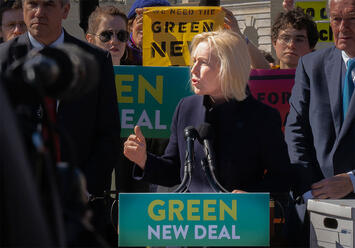
As they contend with their lowest approval ratings in recent memory, Democrats may wish to reconsider some of their least popular positions. Some even suggest the party is preparing to jettison Joe Biden’s “Green New Deal” — once central to his floundering economic agenda. As Axios recently reported, Democratic lawmakers have largely stopped using the term, even as they continue their relentless attacks on all things Trump.
This is just one example of a subtle effort to distance themselves from positions such as climate alarmism, transgender ideology, reparations, and affirmative action — all increasingly out of step with their once-reliable working-class base. But this should be seen less as a genuine change in conviction and more as a tactical retreat from the loudest rhetoric that risks derailing their political recovery. After all, only a handful of Democratic members of Congress voted against the original Green New Deal and they can be expected, like good cadres, to embrace another round as soon as possible.
To date, green politics and opposition to Trump’s climate policies remain one of the most reliable bridges between the two dominant factions within the party: the oligarch-funded establishment and their progressive counterparts. Both support the idea of “net zero”, eliminating all fossil fuel production, and forced urban densification. They may differ on issues such as anti-trust, capital gains, and income redistribution, but not so much on green policies.
Of course, any shift back toward fossil fuels will meet ferocious opposition from progressives and their green allies. The progressives are aware, as the British historian James Heartfield once suggested, that “green capitalism” provides a perfect opportunity for the wealthy to maximise their returns on artificially scarcer resources. They can achieve this from land and agricultural products, notably through mandates and tax breaks for renewable energy.
Ultimately, this hurts middle- and working-class families by raising prices for housing, electricity and gasoline. California, the dominant ideological force in Democratic politics, suffers the highest energy prices in the continental US. The Golden State’s energy prices are double the national average, which has exacerbated “energy poverty”, particularly among the poor and those in the less temperate interior.
These prices reflect the real impact of climate policy. Indeed, in 2023 the California Air Resources Board disclosed that current state climate policies will disproportionately harm households earning less than $100,000 per year, while boosting incomes for those above this threshold.
Read the rest of this piece at: Unherd.
Joel Kotkin is the author of The Coming of Neo-Feudalism: A Warning to the Global Middle Class. He is the Roger Hobbs Presidential Fellow in Urban Futures at Chapman University and and directs the Center for Demographics and Policy there. He is Senior Research Fellow at the Civitas Institute at the University of Texas in Austin. Learn more at joelkotkin.com and follow him on Twitter @joelkotkin.
Photo: Victoria Pickering via Flickr under under CC 2.0 License.












